Samsung HL-P4667W, HL-P5667W, HL-P6167W, HL-P5067W User Manual
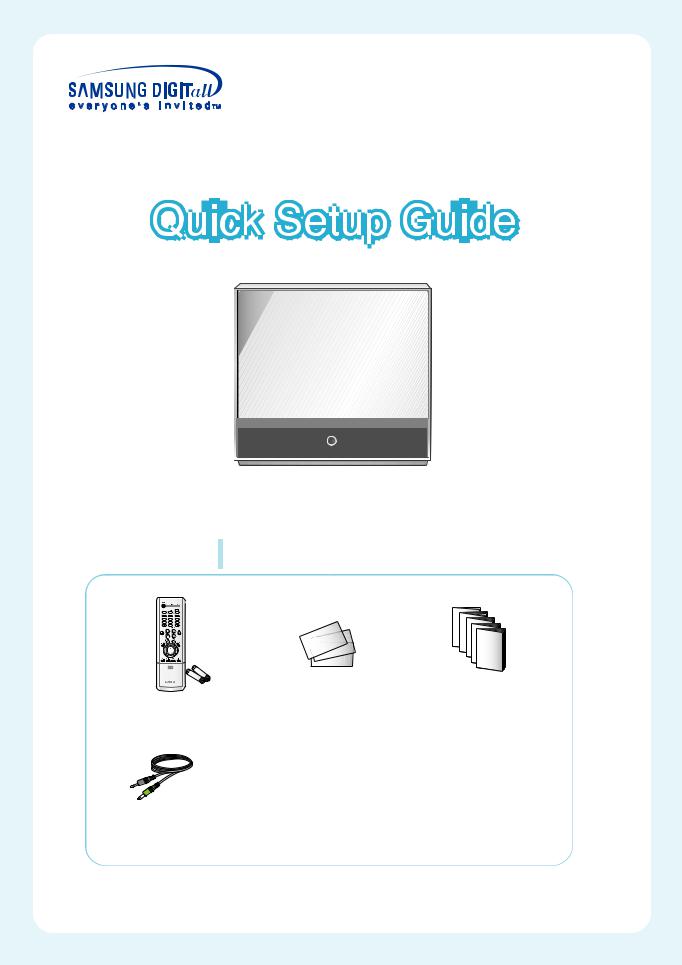
HL-P4667W/HL-P5067W/HL-P5667W/HL-P6167W
 List of Parts
List of Parts
Accessories
Once you have unpacked your TV, check to make sure that you have all the parts shown here. If any piece is missing or broken, call your dealer.
Remote Control (BP59-00076A)/ |
Warranty Cards (2)/ |
Instruction Manual/ |
AAA Batteries |
Registration Card (1) |
Safety Guide/ |
|
|
Quick Guide/ |
|
|
Anynet Manual / |
|
|
Manual Guide |
Anynet Cable
BP68-00429A-01
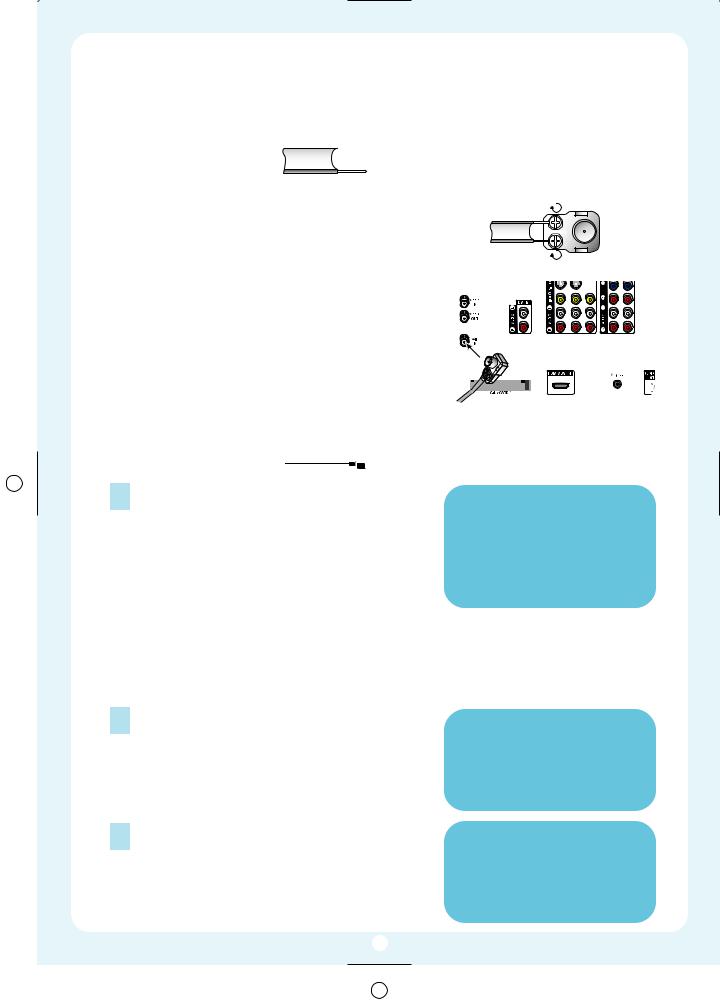
 Connecting VHF and UHF Antennas
Connecting VHF and UHF Antennas
If you do not have a cable system, you will need to connect an antenna to your TV.
Antennas with 300-ohm Flat Twin Leads
If your antenna looks like this:  it has 300-ohm flat twin leads.
it has 300-ohm flat twin leads.
1 |
Place the wires from the twin leads under the |
|
|
|
|
|
|
screws on the 300-75 ohm adaptor (not supplied). |
|
|
|
|
|
|
|
|
|
|
|
|
|
||
|
Use a screwdriver to tighten the screws. |
|
|
|
|
|
|
|
|
|
|
|
|
|
|
|
Plug the adapter into the “Air IN” terminal on the |
|
|
|
|
|
|
|
|
|
|
|
|
|
|
|
|
|
|
|
|
|
|
|
|
|
|
|
|
|
|
2 |
|
|
|
|
|
|
|
rear panel. |
|
|
|
|
|
|
|
|
|
|
|
|
|
|
|
Antennas with 75-ohm Round Leads
If your antenna looks like this: 


 it is an antenna with 75-ohm round leads.
it is an antenna with 75-ohm round leads.
1 |
Plug the antenna lead into the “Air IN” terminal on |
the rear panel. |
Separate VHF and UHF Antennas
If you have two separate antennas for your TV (one VHF and one UHF), you must combine the two antenna signals before connecting the antennas to the TV. This procedure requires an optional combiner-adaptor (available at most electronics shops).
1 Connect both antenna leads to the combiner
2 |
Plug the combiner into the “Cable IN” terminal on |
the rear panel. |
2
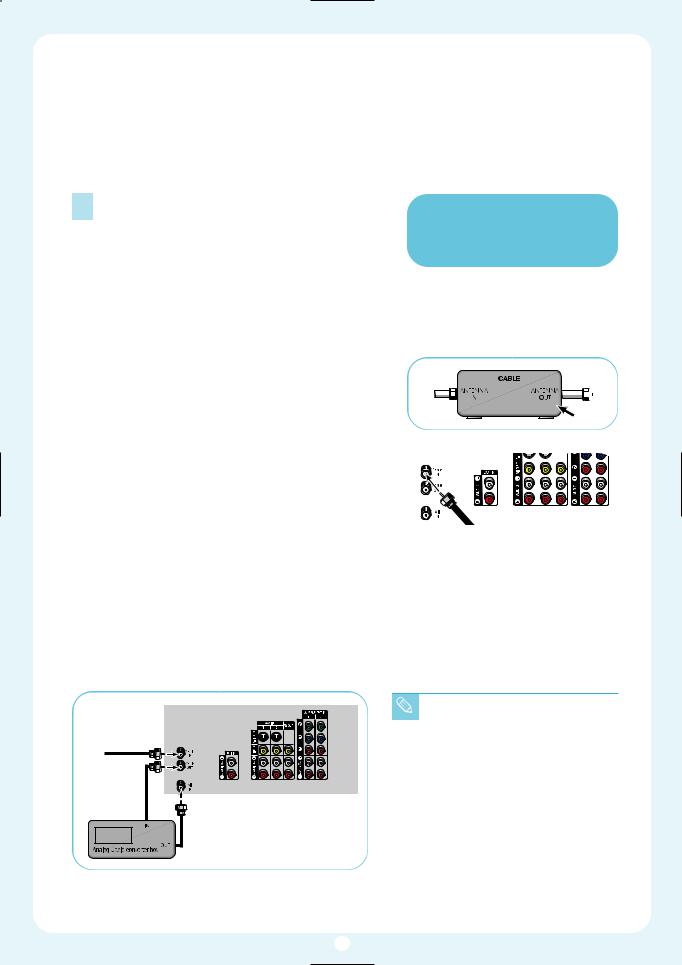
 Connecting Cable TV and VCR
Connecting Cable TV and VCR
You can connect different cable systems to your TV, including cable without a cable box, and cable with a cable box that descrambles some or all channels.
Cable without a Cable Box
If you want to connect cable, and you do not need to use a cable box:
Cable with a Cable Box that Descrambles All Channels
1 |
Find the cable that is connected to the ANTENNA |
|
|
|
|||||
OUT terminal on your cable box. This terminal might |
|
|
|
||||||
|
be labeled “ANT OUT”, “VHF OUT” or simply, |
|
|
|
|
|
|
|
|
|
“OUT”. |
|
|
|
|
|
|
|
|
|
|
|
|
|
|
||||
|
|
|
|
||||||
|
|
|
|
|
|||||
|
Connect the other end of this cable to the “Cable IN” |
|
|
|
|
||||
2 |
|
|
|
|
|
|
|
|
|
terminal on the rear panel. |
|
|
|
|
|||||
|
|
|
|
|
|
|
|
|
|
Connecting an Analog Cable Converter Box
This connection allows you to watch cable and premium channels. You should keep your TV selected to “Cable IN” so that you can use the TV features. When viewing premium channels, select “Air IN” and tune the TV to channel 3 or 4 (whichever channel is vacant in your area), then use the converter box to change channels. You will need two coaxial cables.
From
Cable
3
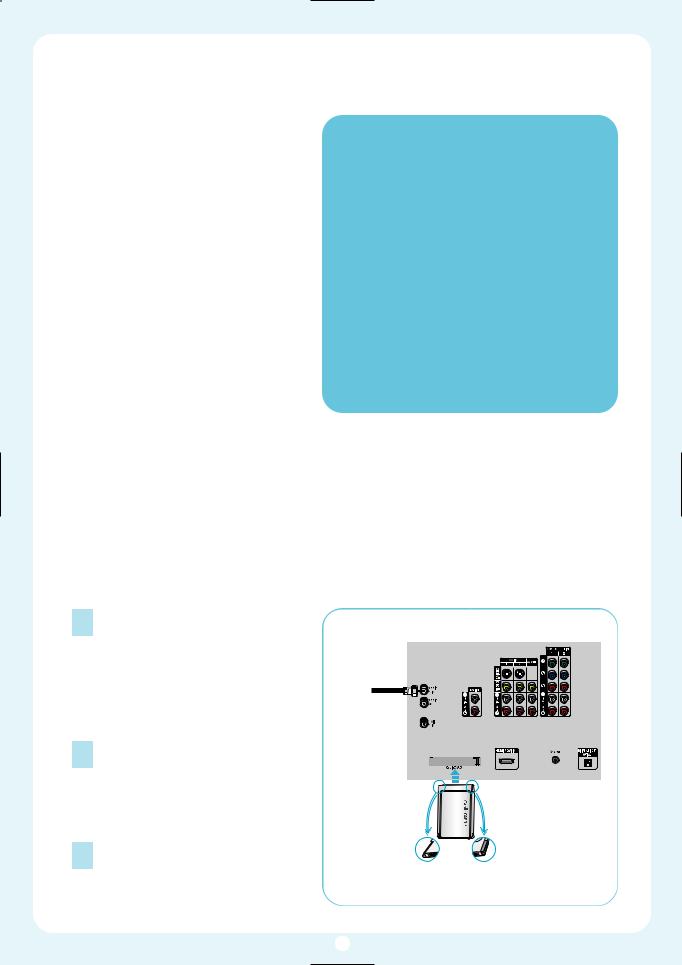
Connecting an Analog Cable Converter Box and a VCR
This connection allows you to watch and |
|
record basic and premium cable channels, |
|
as well as watch videotapes. You should |
|
keep your TV selected to “Cable IN” so that |
|
you can use the TV’s features. When view- |
From |
ing premium channels or recording with the |
Cable |
VCR, select “Air IN” (whichever channel is |
|
vacant in your area), then use the converter |
|
box to change channels. |
|
Caution: If you want to record one channel |
|
while watching another channel, a splitter |
|
(not included) must be added between the |
|
cable and “Cable IN”. One output of the |
|
splitter goes to “Cable OUT” and the sec- |
|
ond output is connected to IN on the cable |
|
converter box. |
|
If you have a mono VCR, connect L/Mono |
|
to VCR Audio OUT using only one audio |
|
cable. |
|
If you have an S-VHS VCR, use the S-Video connections and remove the video cable. Do cable to video1 simultaneously.
When you use a converter box with your TV using the remote control, such as programming nels.
TV Rear Panel
Stereo VCR
 Connecting CableCARD
Connecting CableCARD
You must obtain a CableCARD from a local
1 Insert the CableCARD into the “CableCARD” slot and the message “CableCARD Inserted” is displayed on the screen. If the channel information does not already exist, the message “Updating Channel List” is displayed during channel information configuration.
2 The pairing information containing a telephone number, CableCARD ID, Host ID and other information will be displayed in about 2~3 minutes. If an error message is displayed, please contact your Service Provider.
3 When channel information configuration is finished, the message “Updating Completed” is displayed. It indicates that the channel list is now updated.
TV Rear Panel
Incoming
Cable or
Antenna
Please insert the card as shown.
4
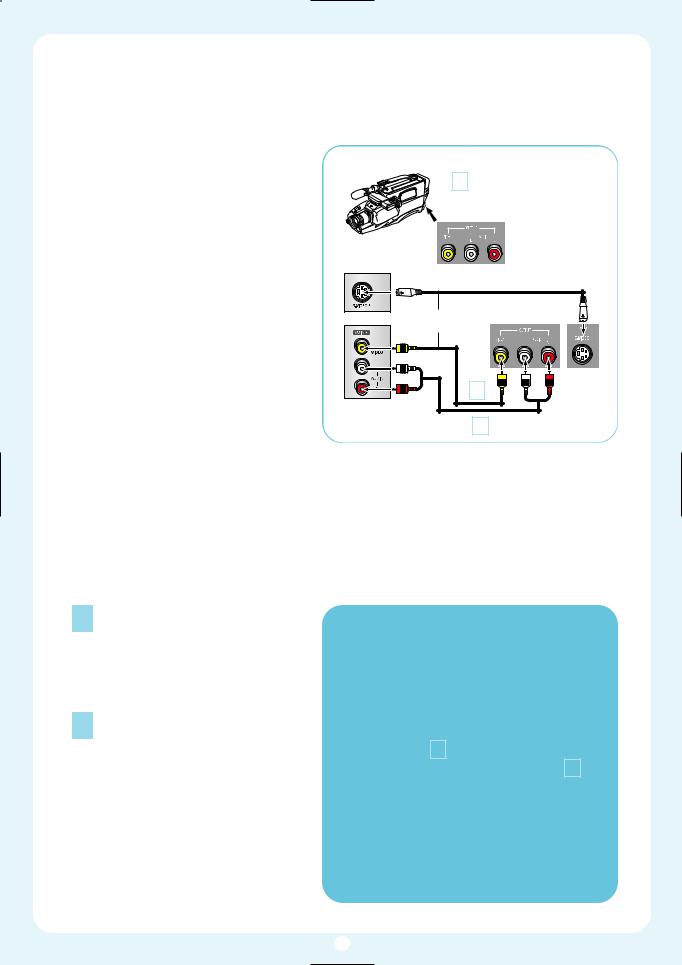
 Connecting a Camcorder
Connecting a Camcorder
The side panel jacks on your TV make it easy to connect a Camcorder to your TV. You can use your camcorder to view tapes without using a VCR.
|
|
|
1 |
Locate the A/V output jacks on the |
|
|
camcorder. They are usually found on |
|
|
||
|
the side or back of the camcorder. |
|
|
Connect a set of audio cables |
|
2 |
||
between the AUDIO IN jacks on the |
||
|
TV and the AUDIO OUT jacks on the |
|
|
camcorder. If you have a mono |
|
|
Camcorder, connect L(mono) to the |
|
|
Camcorder audio out using only one |
|
|
audio cable. |
|
|
Connect a video cable between the |
|
3 |
||
VIDEO IN (or S-VIDEO IN) jack on |
the TV and the VIDEO OUT jack on the Camcorder. The audio-video cables shown here are usually included with a Camcorder. (If not, check your local electronics store.) If your Camcorder is stereo, you need to connect a set of two cables.
1
Camcorder
Output Jacks
TV Rear of right side
Camcorder
or
3
 Connecting a DVD Player
Connecting a DVD Player
The rear panel jacks on your TV make it easy
Connecting to Y,PB,PR
1 Connect a set of audio cables between the COMPONENT (1 or 2) audio (L,R) in jacks on the TV and the AUDIO OUT jacks on the DVD player.
TV Rear Panel
Incoming
Cable or
Antenna
2 |
To enable Component video viewing, |
|
connect a set of video cables |
|
|
|
between the COMPONENT (1 or 2) |
2 |
|
VIDEO (Y, PB, PR) in jacks on the TV |
1 |
|
and VIDEO (Y/PB/PR or Y/CB/CR) OUT |
|
|
|
jacks on the DVD player.
Note: For an explanation of Component video, see your DVD player's owner's manual.
DVD Player
5
